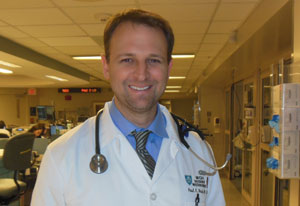Profile: Fogarty Scholar Dr Paul Drain helps accelerate disease diagnoses in South Africa
March / April 2014 | Volume 13, Issue 2

Photo courtesy of Dr. Paul Drain
During his time as a Fogarty Scholar, Dr. Paul Drain
helped assess TB and HIV point-of-care diagnostics
to reduce treatment delays for patients in South
Africa.
By Arthur Allen
As a medical student on a Fogarty Fellowship in Dar es Salaam, Tanzania in 2005, Paul Drain watched AIDS patients die because they couldn't afford needed medicines. After each day's rounds, Drain would spend hours writing in a journal just to keep from feeling totally powerless.
Eight years later, on his second Fogarty-sponsored research experience, in South Africa, the drugs are there - at least for HIV patients - thanks to global initiatives. But keeping patients alive after diagnosis still involves hurdles. The focus of his work today is developing easy, cheap ways around them.
"My group at Harvard has done several studies showing that when these patients leave the clinic, around 40 percent never come back," Drain says. Many of those told to return for the results of tuberculosis tests, or CD4 counts that indicate the seriousness of HIV infection, never do.
Drain used his two-year award from the Fogarty's Global Health Program for Fellows and Scholars to assess point-of-care diagnostics that can short-circuit such delays. One is a urine test for TB that resembles a home pregnancy kit; the second a modular CD4 cell counter. Both provide results in 20 minutes.
"This way, the patient is still there and we can start treatment right away. We don't have to send samples to the lab, to pay for transportation and processing," he says. "Also, nurses aren't exposed to the risk of TB by getting patients to cough for sputum samples."
Drain is continuing his research at the KwaZulu-Natal Province clinic, where 40 people are tested each day. About a third are found to be HIV-positive, and about 20 percent of the HIV patients are also positive for tuberculosis, including extreme drug-resistant strains. The intersection of the two has just been devastating. Doctors will not start patients on a regimen of HIV medications until they can exclude a TB diagnosis, because TB must be brought under control before a patient can take antiviral drugs that will strengthen his or her immune system. The faster it all happens, the better the results - for the patient and public health - since untreated diseases spread to others in the community.
Drain first got interested in public health as a Peace Corps volunteer in Morocco in 1997. He had nothing more than a freshly printed bachelor's degree in microbiology. With no doctor or nurse in his village, Drain became a kind of de facto public health administrator, helping to build bathhouses and set up an immunization program.
After returning to the United States, Drain earned both a master's in public health and a medical diploma at the University of Washington, Seattle. After his third year in medical school, he spent a year in Tanzania as a Fogarty Fellow, working under Dr. Wafaie Fawzi, professor of nutrition and epidemiology at the Harvard School of Public Health.
Drain's enthusiasm for the work led him in 2008 to publish a practical reference guide for students, called "Caring for the World: A Guidebook to Global Health Opportunities." He's currently working on two related books, and spends several weeks every three months conducting research at King Edward Hospital and the Ithembalabantu People's Hope Clinic in Durban, South Africa.
There are more opportunities than ever before to participate in global health and they're easier to access, notes Drain. "Young people are thinking more globally than generations before. They want to diversify their training, see different types of diseases," Drain concluded. "Fogarty's support has allowed me and many other people to continue doing global work. Without their support a lot of this wouldn't be possible."
More Information
To view Adobe PDF files,
download current, free accessible plug-ins from Adobe's website.